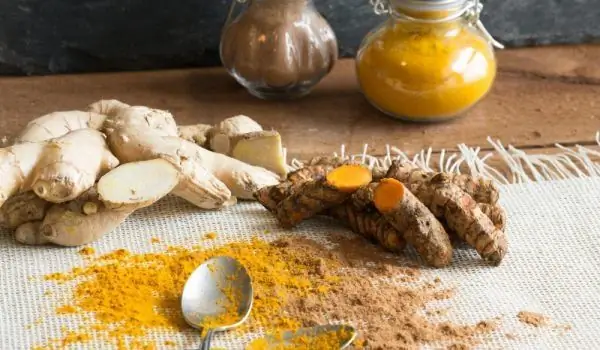2025 Author: Jasmine Walkman | [email protected]. Last modified: 2025-01-23 10:18
As most of us know, turmeric is a spice with a deep yellow color. It is widely used in Indian and Southeast Asian cuisine. It is prepared from the root of the Curcuma longa plant and is also used as a natural pigment in the food industry.
Curcumin, which is contained in the spice, is believed to be an antioxidant that protects the body from damage to reactive molecules. They are generated in the body as a result of metabolism and cause cell damage. They are also known as free radicals.
It is also widely believed that the spice has anti-inflammatory, antibacterial and anti-cancer properties, and that it promotes the death of cells that are dangerous to the body or no longer needed by the body. Precisely because of these almost miraculous properties, curcumin has been the subject of numerous studies.
Chronic inflammation is associated with the development of many diseases such as obesity, diabetes, heart disease and cancer. There is some evidence that curcumin reduces the levels of certain substances (cytokines) that cause inflammation.
Systematic reviews and meta-analyzes, which combine data from several randomized controlled trials, support this finding to some extent. Scientists have shown that curcumin reduces body pain similar to ibuprofen.

But experts also believe that the positive change is likely to be due to a placebo effect caused by the positive image of the spice.
Curcumin is also thought to be beneficial in preventing insulin resistance. In clinical trials, scientists have been able to prove that the substance lowers blood sugar levels, but with very small values. Science still cannot say whether the spice improves heart health.
Curcumin has also been extensively studied for its anti-cancer properties. Laboratory and animal studies support this claim, but there is no evidence of cancer prevention in human studies.
There is some evidence that curcumin reduces the severity of side effects from radiation therapy, such as radiation-induced dermatitis and pneumonitis (inflammation of the lungs), but not the cancer itself.
Recommended:
Is Cheese Really Useful?

Even young children know that it is useful to eat cheese . It contains many useful enzymes of lactic acid microorganisms. Usually we Bulgarians eat cow's cheese, which is made from fresh milk from cows. But sheep's and goat's cheese are very good choices.
Why Are Pumpkin Seeds Really Useful?

Pumpkin seeds are rich in protein and useful fats - so it is written in many directories. But it must be said that the word rich does not at all depict the real picture. These seeds are much more useful than you expect. Pumpkin seeds contain up to 52 percent butter and up to 30 percent protein.
Is It Really Useful To Have The Finished Smoothie In A Bottle Or Not

The basis of all smoothies are fruit purees (and some vegetables). Unlike fresh juices and fresh juices, smoothies contain more fiber because the fruit is ground rather than squeezed. The first smoothies appeared in the 1930s with the production of the electric blender in the United States and consisted of fruit puree and ice.
Useful Properties Of Turmeric

Turmeric is a well-known spice in cooking, but in addition to cooking, it can be used in traditional folk medicine and save us from a lot of health ailments. It has a very light aroma and taste and is extremely useful for a very large part of our ailments.
Do Not Overdo It With Turmeric, No Matter How Useful It Is

More and more people are aware of the almost miraculous health benefits of turmeric. The spice, which is able to give a unique taste to each dish, has a powerful antioxidant and anti-inflammatory effect, which makes it one of the best means to fight free radicals in the body and most diseases caused by them.

